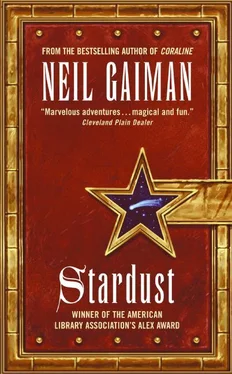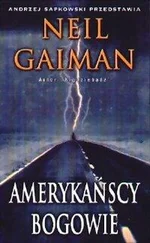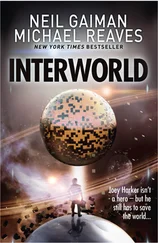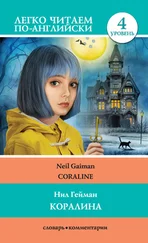Mr. Monday grinned, though it made him look as if he had a toothache. Then he held out a hand for Victoria, and she rose from the chair.
“If you wish to see the star, Miss Forester …” said Tristran, but Victoria shook her head.
“I am delighted that you came home safely, Mister Thorn. I trust that I shall see you at our wedding?”
“I’m sure that nothing could give me greater pleasure than to be there,” said Tristran, although he was sure of no such thing.
On a normal day it would have been unheard-of for the Seventh Magpie to have been so crowded before breakfast, but this was market day, and the Wall-folk and the strangers were crowded into the bar, eating heaped plates of lambchops and bacon and mushrooms and fried eggs and black pudding.
Dunstan Thorn was waiting for Tristran in the bar. He stood up when he saw him, walked over and clasped him on the shoulder, without speaking. “So you made it back without hurt,” he said, and there was pride in his voice.
Tristran wondered if he had grown while he was away; he remembered his father as a bigger man. “Hello Father,” he said. “I hurt my hand a bit.”
“Your mother has breakfast waiting for you, back at the farm,” said Dunstan.
“Breakfast would be wonderful,” admitted Tristran. “And seeing Mother again, of course. Also we need to talk.” For his mind was still on something that Victoria Forester had said.
“You look taller,” said his father. “And you are badly in need of a trip to the barber’s.” He drained his tankard, and together they left the Seventh Magpie and walked out into the morning.
The two Thorns climbed over a stile into one of Dunstan’s fields, and, as they walked through the meadow in which he had played as a boy, Tristran raised the matter that had been vexing him, which was the question of his birth. His father answered him as honestly as he was able to during the long walk back to the farmhouse, telling his tale as if he were recounting a story that had happened a very long time ago, to someone else. A love story.
And then they were at Tristran’s old home, where his sister waited for him, and there was a steaming breakfast on the stove and on the table, prepared for him, lovingly, by the woman he had always believed to be his mother.
Madame Semele adjusted the last of the crystal flowers on the stall, and eyed the market with disfavor. It was a little past noon, and the customers had just started to wander through. None of them had yet stopped at her stall.
“Fewer of them and fewer of them, every nine-year,” she said. “Mark my words, soon enough this market will be just a memory. There’s other markets, and other marketplaces, I am thinking. This market’s time is almost over. Another forty, fifty, sixty years at the most, and it will be done for good.”
“Perhaps,” said her violet-eyed servant, “but it does not matter to me. This is the last of these markets I shall ever attend.”
Madame Semele glared at her. “I thought I had long since beaten all of your insolence out of you.”
“It is not insolence,” said her slave. “Look.” She held up the silver chain which bound her. It glinted in the sunlight, but still, it was thinner, more translucent than ever it had been before; in places it seemed as if it were made not of silver but of smoke.
“What have you done?” Spittle flecked the old woman’s lips.
“I have done nothing; nothing that I did not do eighteen years ago. I was bound to you to be your slave until the day that the moon lost her daughter, if it occurred in a week when two Mondays came together. And my time with you is almost done.”
It was after three in the afternoon. The star sat upon the meadow grass beside Mr. Bromios’s wine-and-ale-and-food stall, and stared across at the gap in the wall and the village beyond it. Upon occasion, the patrons of the stall would offer her wine or ale or great, greasy sausages, and always she would decline.
“Are you waiting for someone, my dear?” asked a pleasant-featured young woman, as the afternoon dragged on.
“I do not know,” said the star. “Perhaps.”
“A young man, if I do not mistake my guess, a lovely thing like you.”
The star nodded. “In a way,” she said.
“I’m Victoria,” said the young woman. “Victoria Forester.”
“I am called Yvaine,” said the star. She looked Victoria Forester up and down and up again. “So,” she said, “you are Victoria Forester. Your fame precedes you.”
“The wedding, you mean?” said Victoria, and her eyes shone with pride and delight.
“A wedding, is it?” asked Yvaine. One hand crept to her waist, and felt the topaz, upon its silver chain. Then she stared at the gap in the wall, and bit her lip.
“Oh you poor thing! What a beast he must be, to keep you waiting so!” said Victoria Forester. “Why do you not go through, and look for him?”
“Because…” said the star, and then she stopped. “Aye,” she said. “Perhaps I shall.” The sky above them was striped with grey and white bands of cloud, through which patches of blue could be seen. “I wish my mother were out,” said the star. “I would say good-bye to her, first.” And, awkwardly, she got to her feet.
But Victoria was not willing to let her new friend go that easily, and she was prattling on about banns, and marriage licenses, and special licenses which could only be issued by archbishops, and how lucky she was that Robert knew the archbishop. The wedding, it seemed, was set for six days’ time, at midday.
Then Victoria called over a respectable gentleman, greying at the temples, who was smoking a black cheroot and who grinned as if he had the toothache. “And this is Robert,” she said. “Robert, this is Yvaine. She’s waiting for her young man. Yvaine, this is Robert Monday. And on Friday next, at midday, I shall be Victoria Monday. Perhaps you could make something of that, my dear, in your speech at the wedding breakfast—that on Friday there will be two Mondays together!”
And Mr. Monday puffed on his cheroot, and told his bride-to-be that he would certainly consider it.
“Then,” asked Yvaine, picking her words with care, “you are not marrying Tristran Thorn?”
“No,” said Victoria.
“Oh,” said the star. “Good.” And she sat down again.
She was still sitting there when Tristran came back through the gap in the wall, several hours later. He looked distracted, but brightened up when he saw her. “Hello, you,” he said, helping her to her feet. “Have a good time waiting for me?”
“Not particularly,” she said.
“I’m sorry,” said Tristran. “I suppose I should have taken you with me, into the village.”
“No,” said the star, “You shouldn’t have. I live as long as I am in Faerie. Were I to travel to your world, I would be nothing but a cold iron stone fallen from the heavens, pitted and pocked.”
“But I almost took you through with me!” said Tristan, aghast. “I tried to, last night.”
“Yes,” she said. “Which only goes to prove that you are indeed a ninny, a lackwit, and a … a clodpoll.”
“Dunderhead,” offered Tristran. “You always used to like calling me a dunderhead. And an oaf.”
“Well,” she said, “you are all those things, and more besides. Why did you keep me waiting like that? I thought something terrible had happened to you.”
“I’m sorry,” he told her. “I won’t leave you again.”
“No,” she said, seriously and with certainty, “you will not.”
His hand found hers, then. They walked, hand in hand, through the market. A wind began to come up, flapping and gusting at the canvas of the tents and the flags, and a cold rain spat down on them. They took refuge under the awning of a book stall, along with a number of other people and creatures. The stallholder hauled a boxful of books further under the canvas, to ensure that it did not get wet.
Читать дальше








